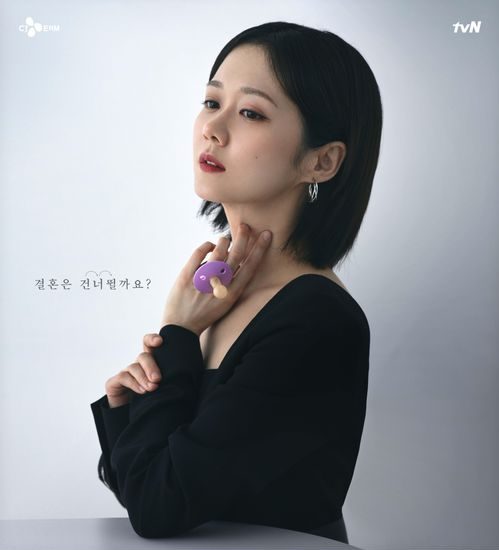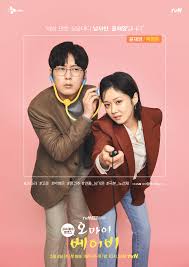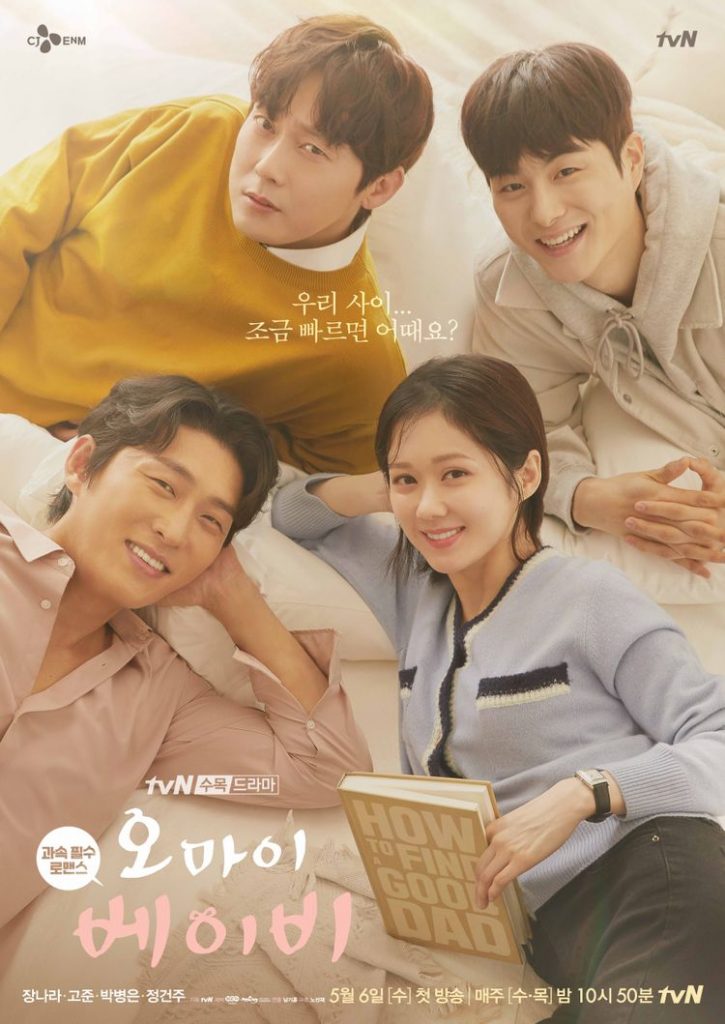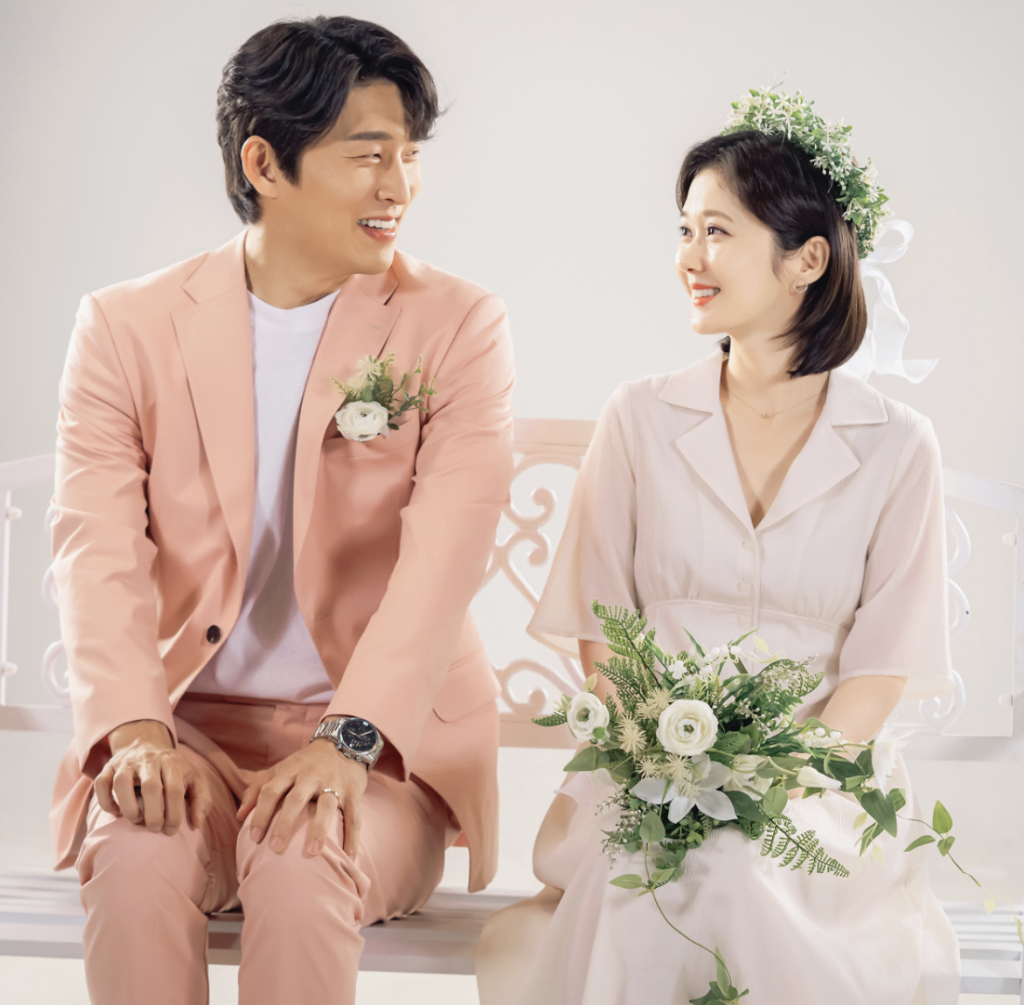
What does an unmarried woman nearing her forties do when her dream is to be a mother? This is the guiding question of tvN’s latest romantic comedy Oh My Baby. The drama explores different perspectives on parenthood and family as its protagonist pursues her dream of having a child. Though Oh My Baby begins critical conversations about motherhood, fertility, and relationships, it fails to follow through. What could have been an important intervention in the Sampo Generation dissolves into a repetition and unnecessary subplots. Bright spots include the vibrant cast members and well-timed jokes. Overall, it’s worth a watch on double speed if only to see Go Joon play a sappy and romantic lead.
Oh My Baby centers around Jang Ha Ri (Jung Nara) and the difficulties she faces in achieving her dream of being a mother. In a visit to the doctor, she is diagnosed with endometriosis and told she doesn’t have much time left to have a child. Just as she decides to explore other options for motherhood, three men catch her eye as potential partners. The men are each uniquely positioned to be a husband and potential father: Han Yi Sang (Go Joon) is a well-known photographer, Yoon Jae Young (Park Byung Eun) is a pediatrician and single father to a daughter of his own, and Choi Kang Eu Ddeum (Jung Gun Joo) is a rookie employee who works with Ha Ri.

The drama successfully explores Ha Ri’s unique position as a 39-year-old woman. Though it is clear that she’s a devoted daughter, successful career woman, and loyal friend, she is best defined by her status as an unmarried woman without children. This identity is consistently surfaced because she works as a deputy manager at a parenting magazine called “The Baby.” Her proximity to children is a constant reminder of her dream to be a mother, alternately poignant and lighthearted.
This position also makes her vulnerable to external judgment; Ha Ri is told time and again that she has little mobility in the company and cannot be promoted to Editor-in-Chief because she is not a mother herself. This subverts standard conversations about women in the workplace and explores how society views women who do not have children at such an age.
Oh My Baby introduces alternatives for motherhood, but dismisses them too quickly as viable options. For instance, after learning that she has little time left to become naturally pregnant, Ha Ri decides that she will become a mother without getting married. In a conversation with her OB-GYN, it is revealed that it is against the law for unmarried women to find a sperm donor in Korea, leaving her only options as getting married or finding a random man to sleep with. The drama could have spent more time exploring this subject, and it’s not until later in the season that a friend suggests adoption, which Ha Ri quickly rejects as an option. Though the show centralizes the stories of two single parents (her mom and Jae Young), it seems Ha Ri fails to fully consider this option. Alternative options for parenthood seem to exist outside of the protagonist only.
Instead, the show explores the struggles of a heterosexual couple and their pursuit of parenthood. Though fertility is the defining conflict of Ha Ri and Yi Sang’s relationship, the drama belabors this struggle. The couple is seen breaking up and getting back together multiple times over the same struggle – though realistic, the drama’s timing of this makes it frustrating to watch play out. In general, the struggle with pacing made the relationship between a 39 and 41-year-old feel much more immature, oftentimes striking the wrong tone. Even worse, a love triangle overcomplicates and frustrates things unnecessarily.

On the other hand, these additional plotlines and characters are useful to contextualize modern parenthood. Among the people in Ha Ri’s life, there is diversity in terms of their relationship to children. Ha Ri’s boss illustrates the difficulty mothers face when balancing work with children, her best friend laments her lost free time, and her mother is a testament to the devotion of single mothers. Still, the audience hears Ha Ri’s mom plead with her not to “repeat her mistakes.” As a result, Ha Ri’s mother fields questions about her daughter’s plans for marriage and motherhood and even meddles in Ha Ri’s dating life. One coworker even declares that her and her partner have decided to forego children altogether.
Such diversity in opinion and experience successfully reflects many of the struggle facing young women and men in South Korea today. According to the World Bank, fertility rates (the average number of births a woman will have in her lifetime) in Korea have been declining for decades; in 1960, there were 6.10 births per woman and in 2019, South Korea’s fertility rate fell to 0.92. For context, the global average in 2019 was 2.5, and such a low fertility rate puts South Korea near the bottom of the lowest fertility rates in the world. It is no wonder that Ha Ri and others around her feel pressure to have a child and seem to view parenthood as an impossible dream.

Oh My Baby characterizes many of the factors that have contributed to declining birth rates. Anti-natal policies, economics crises, and a growing female labor force among other factors, have caused declining fertility rates since the 1960s in South Korea. Currently, a competitive job market means that young adults are unable to balance careers with family life (consider Ha Ri’s boss). This problem compounds with traditional gender roles, wherein women are confined to the home as wives and mothers. Indeed, Oh My Baby illustrates the difficulty experienced by working mothers to be taken seriously as both successful employees and good parents, but relegates them to minor characters and doesn’t fully explore their impact.
The result of declining birth rates is what sociologists have labeled the “Sampo Generation.” The word “sampo” means to give up three things: relationships, marriage, and children. According to the Korea Institute for Health and Social Affairs (KIHSA), as of 2018, a majority of South Koreans ages 20 to 44 were single, and among these, 51% of men and 64% of women said they were choosing to remain single.
The closest example of the Sampo Generation in Oh My Baby is Ha Ri’s coworker Park Yeon Ho (Baek Seung Hee) who has decided with her partner not to have any children. Ha Ri herself voices this generation in her struggles, saying “I’d rather be single and happy.” Still, Ha Ri’s journey still hingers around her desire for both children and love. Even “The Baby” faces closure due to a lack of audience – perhaps reflective of the nation’s fertility rate. Overall, Oh My Baby fails to truly capture the disenchantment of the Sampo Generation despite covering the same contested topics.

The intended effect might be the opposite – to inspire young men and women to consider parenthood. While the difficulties Ha Ri and others face in getting married and having children are not always clear, her reasons for wanting a child are unmistakable. At the end of the first episode, Ha Ri reflects on a conversation she had with her mother as a child, in which she tells her mom she too wants to be a mother so she can be just as happy. As Ha Ri explores her options for motherhood, she realizes the struggle and stigma that her own mom faced, and gains a new appreciation for her mother’s support.
The ending underscores an overall message of hope and resilience. As “The Baby” transitions to a digital era and Ha Ri’s next move is uncertain, she writes:
“Tomorrow, we will probably face a different question and a quest, and I hope that you’ll find your own answers.”
The penultimate scene shows the “The Baby” discussing their dreams, each with some sign that the dreamer is pregnant or will have a child. Even Ha Ri’s mom admits she’s been having conception dreams to some friends. The show ends without showing Ha Ri pregnant or with child… or so it seems. A short epilogue (blink and you’ll miss it) shows Yi Sang carrying Ha Ri in his arms in the hospital – she is going to give birth. This resolution seems to gloss over the previous struggle and uncertainty, especially in the context of South Korea where fertility rates are so low.

The saccharine ending is predictable. Ha Ri manages to fall in love and get pregnant, what the show presents as the best option for a woman in her position. Her struggle before this was interpersonal – she couldn’t find a husband whose dream of being a parent aligned with hers – and any alternate options, like sperm donation or adoption, were dismissed outright. The plot quickly becomes repetitive as a result, even though the tone shifts in response to Ha Ri’s changing mission, from finding a sperm donor to making it work with her boyfriend. Meanwhile, single parents and working mothers face social stigma and professional uncertainty. These characters feel underdeveloped and represent various conflicts that aren’t followed up on.
Nevertheless, it is satisfying to watch Ha Ri realize that she can find happiness in a life she hadn’t anticipated. The various struggles related to parenthood are lightly touched upon, never fully exposed onscreen, and diminish the drama’s realism. The drama might have been condensed to a 12-episode format, cutting the love triangle and other unnecessary plot points to better pace the main conflict.
In many ways, Oh My Baby starts with a bang that fizzles out. There was great potential for the writer to critically explore motherhood in the Sampo Generation, but audiences were left with a rather traditional take on romance.
(Images via tvN. World Development Indicators, The World Bank. BBC.).


